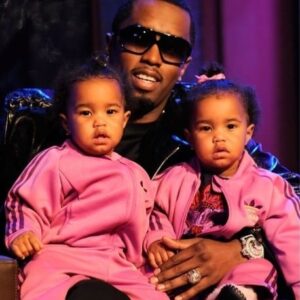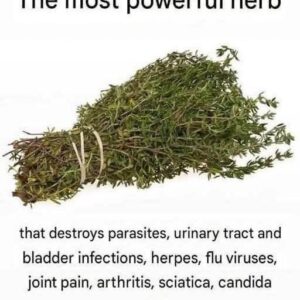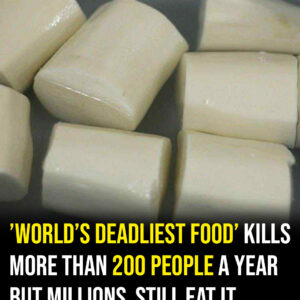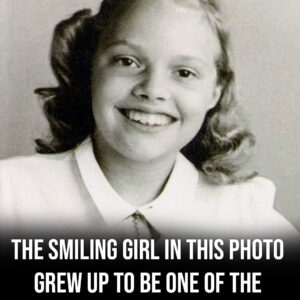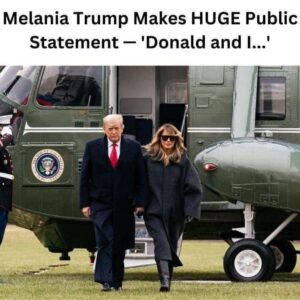The evening began as unremarkably as any other—gray skies hanging low, the air thick with the scent of distant rain and diesel.
I was driving home from another long, draining day, the kind that makes you wonder if you’ve been living on autopilot.
The road ahead stretched endlessly, a strip of fading asphalt cutting through the hills like a tired memory.
The sun was dying behind the clouds, painting the horizon in shades of purple and gold.
I had the windows cracked just enough to feel a breath of cool air against my face, the kind that keeps you awake when your thoughts start to wander.
I remember thinking about how quiet the world felt, how small I was beneath the weight of it.
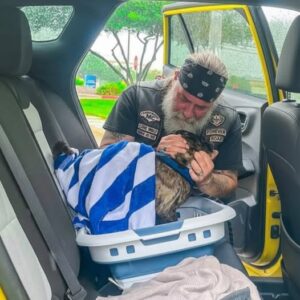
Then, out of the corner of my eye, something caught my attention—a glint of chrome and the faint shape of a motorcycle pulled awkwardly to the side of the highway.
At first, I almost drove past it.
It’s strange how we’re trained not to stop. My mother’s warnings echoed in my mind, old and familiar: “Never stop for bikers or strangers on the road. You never know who they really are.” That lesson had become second nature—see something uncertain, keep driving. The world teaches us to protect ourselves before we even think of helping someone else.
But something about this scene felt different.
The motorcycle wasn’t just parked—it was abandoned at an angle that screamed distress. And beside it, in the ditch, a man was kneeling. The fading sunlight reflected off his silver hair and leather jacket. From a distance, he looked like every stereotype my mother had ever warned me about: big, rough, intimidating. But as I slowed down and looked closer, what I saw wasn’t danger. It was heartbreak.
He wasn’t angry or threatening. He was crying.
And in his hands, wrapped in a worn blue towel, was something small—something trembling. My pulse quickened as I pulled over onto the shoulder and stepped out of my car. I could hear it then, faint but unmistakable—a soft whimper coming from the bundle.
When I got closer, I saw her.
A tiny German Shepherd puppy, no more than a few weeks old, lying limp in the man’s hands. Her fur was matted with dirt and streaks of blood, one leg twisted in a way that made me wince. She looked so fragile, so impossibly small against this giant of a man. Tears streamed down his face as he whispered words meant to comfort her, his deep voice breaking with every syllable.
“Someone hit her,” he said when he noticed me. His voice was raw, shaking. “They didn’t stop. She dragged herself off the road. I couldn’t leave her there.”
I felt something in me break. The sadness in his tone carried a weight that couldn’t be faked. It was the sound of a man whose heart had been cracked open by helplessness.
“Is she breathing?” I asked, my voice barely audible.
He nodded slightly. “Barely. I called a vet in Riverside—about twenty minutes from here.”
I looked down at the tiny creature, her chest rising shallowly. Twenty minutes was too long.
“My car’s faster,” I said without thinking.
He looked up at me, startled, then nodded. “God bless you,” he whispered.
He lifted the towel gently, holding the puppy as though she were made of glass, and followed me to the car. He slid into the back seat, still cradling her close. I hit the gas and we sped off, the world narrowing down to the sound of the tires on wet pavement and the faint whimpers from the bundle in his arms.
“Stay with me, sweetheart,” he murmured softly. “You’re safe now. Nobody’s ever gonna hurt you again. Not ever.”
His voice cracked on the last word, and I gripped the steering wheel tighter. There was a strange ache in my chest, a realization that maybe I’d forgotten what genuine care looked like.
“What’s your name?” I asked quietly, glancing at him through the rearview mirror.
“Nomad,” he said after a pause. “Real name’s Robert. Been riding for thirty-eight years. Seen a lot, done a lot. But I’ve never passed an animal in need. Not once.”
“I’m Chris,” I replied. “And I almost didn’t stop.”
He smiled faintly, one corner of his mouth lifting. “You stopped. That’s what matters.”
We ran a red light without even thinking. Nobody honked. It was as if the universe itself had cleared the path for us.
Fourteen minutes later, we screeched into the parking lot of the Riverside Veterinary Clinic. Nomad jumped out before I could stop the car completely, clutching the tiny puppy like she was the most precious thing in the world.
“Hit by a car,” he told the vet tech who ran out to meet him. “Broken leg, maybe worse. Please—help her.”
They rushed her inside, disappearing behind swinging doors. Then silence.
Nomad sank into a chair in the waiting area, his large hands clasped so tightly they trembled. I sat beside him, unsure what to say. His head hung low, as though he were praying—or maybe trying to keep himself from falling apart.
Two hours passed like a slow storm. The ticking of the wall clock became unbearable. The smell of antiseptic and rain filled the air. And still, we waited.
Finally, the vet emerged—a woman in her fifties, her expression kind but weary. She looked at us and smiled softly. “She’s stable,” she said. “Broken femur, some bruising and road rash, but no internal bleeding. She’ll need surgery, but she’s a fighter.”
Nomad exhaled a sound I’ll never forget—a mix of a sob and a laugh, like someone finally surfacing for air after nearly drowning. “Thank you,” he whispered, his voice trembling.
“Does she have an owner?” the vet asked.
He shook his head. “No collar, no chip. She’s alone.”
The vet sighed gently. “After treatment, she’ll go to the shelter unless someone claims her. But the surgery is costly. If she doesn’t get it soon…”
He didn’t wait for her to finish. “How much?”
“Three thousand, maybe more,” she said carefully.
He didn’t even blink. “I’ll pay it. All of it. And when she’s better, she’s coming home with me.”
The vet’s eyes widened. “Sir, that’s—”
He cut her off softly. “No ‘sir.’ Just a man who found something worth saving.”
I watched him sign the papers, his hands still shaking. Every assumption I’d ever had about him—about men like him—collapsed under the weight of that moment.
When he turned to me, his eyes were red but steady. “Chris, you didn’t have to stop. But you did. Thank you.”
“You’re the one paying the bill,” I said.
He smiled faintly. “Money’s just paper. Life’s worth more.”
When they let him see her before surgery, he came back out minutes later, eyes glistening. “She wagged her tail,” he whispered, voice breaking. “She’s hurt, but she still wagged her tail.”
That was it for me. The tears I’d been holding back fell freely. We both sat there, two strangers in a sterile waiting room, crying over a small dog that refused to give up.
“The world’s hard enough,” he said softly. “We gotta be soft where we can be.”
Three long hours passed before the vet returned. “The surgery went well,” she said. “She’s going to make it.”
Nomad bowed his head, shoulders shaking with quiet relief. “She’s gonna walk again,” she continued. “She’s tougher than she looks.”
He wiped his face and smiled weakly. “Then so am I.”
As the rain started to fall outside, we sat there in silence, sipping bitter coffee and trading pieces of our lives like old friends. He told me he was a Vietnam vet. A widower. A mechanic by trade. Two grown kids he rarely saw. He said he’d been riding that night to clear his head, trying to remember what peace felt like—until he heard the faint cry that stopped his world.
“One second later,” he said, staring into his coffee, “and I would’ve missed her. Guess I was meant to find her.”
When the vet came back with the final paperwork, Nomad filled it out meticulously. He asked about her medication, her diet, her physical therapy. There was a new steadiness in him—a purpose he hadn’t felt in years.
When it was time to leave, I offered to drive him back to his bike. The rain had turned to a mist, and the air smelled like new beginnings. When we pulled up beside the motorcycle, he turned to me and handed me a small, weathered card with his number scrawled across it.
“If you ever need anything,” he said, his voice firm but kind, “you call me. You saved her life tonight. That means you’re family now.”
I smiled, blinking back tears. “What are you going to name her?”
He paused, then smiled—a real, full smile that lit up his face. “Hope,” he said softly. “Because that’s what she is. Hope that we can still be good. Hope that it’s never too late to make things right.”
He climbed onto his bike, the engine rumbling beneath him like a heartbeat, and disappeared down the road. I stood there in the dim light, watching until his taillight faded into the distance.
Six weeks later, my phone buzzed with a message from an unknown number. It was a photo—a healthy little German Shepherd, standing proudly on all four legs, wearing a pink collar and the brightest eyes I’d ever seen. The text read:
“Hope says thank you to Uncle Chris. She’s home.”
I sat at my kitchen table and cried. Not the quiet kind of tears that slip away unnoticed, but the kind that come from deep inside, washing away cynicism and doubt.
That night, I realized something powerful.
Sometimes the people we fear most are the ones with the biggest hearts. Sometimes kindness hides behind leather and tattoos, waiting for a reason to show itself. And sometimes, a tiny injured puppy on a lonely highway can remind two strangers—and maybe all of us—that compassion still exists in the world.
Nomad didn’t just save a dog that night. He saved something far rarer.
He saved a little faith in the rest of us.
